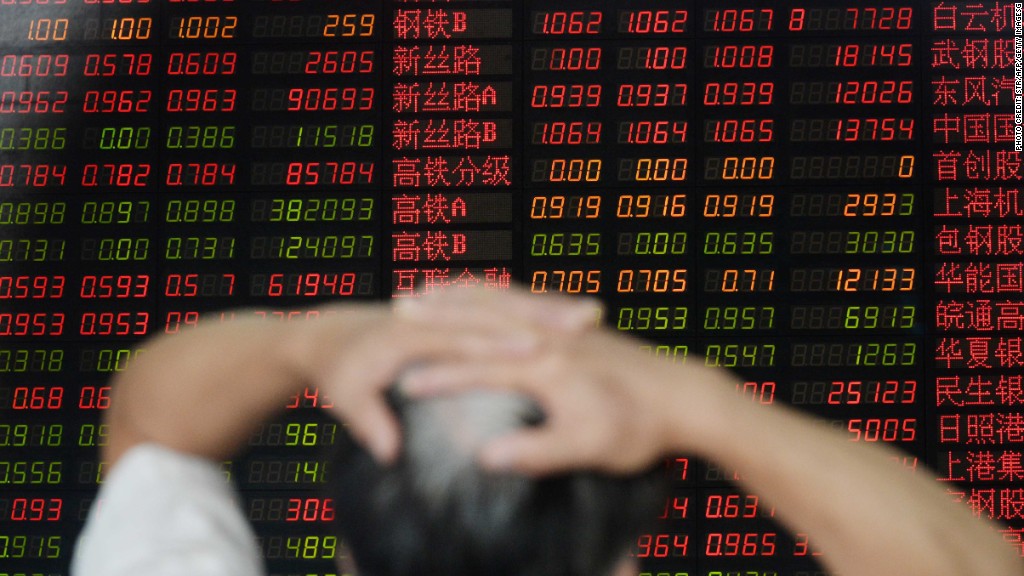
China's growth miracle is cracking. The country no longer seems to know what it's doing when it comes to the economy and, especially, financial markets.
The government basically told people to go out and buy stocks last spring -- just before the market peaked.
It spent a whopping $500 billion in the past year to prop up its currency, only to turn around and cut the value of the yuan.
China's Communist Party has taken extraordinary measures in an attempt to do what no one in the world has ever been able to do: stop market volatility. It's gone as far as halting the stock market for almost an entire day on January 7 to using government money to buy stocks.
Yet the Chinese stock market has continued to tank.
Now the main market in Shanghai is in bear territory, and it's dragging the rest of the world down too, including the U.S.
On top of that, Chinese CEOs and executives continue to "disappear" and no one trusts the government's economic statistics. China says it's still growing at close to 7%. Independent experts say the real figure is probably half that.
China's economic miracle appears to be hitting a Great Wall of Ignorance.
Related: Chinese stocks in bear market
The world finally woke up on China
But here's the real takeaway: Why did it take the rest of the world so long to figure out that China didn't have it all under control?
"The surprise is it didn't happen sooner," says Richard Sylla, a financial historian and professor at New York University's Stern School of Business.
There isn't a playbook for what China's going through. It's in trial and error mode, and it's going to make a lot more mistakes in 2016 (and beyond).
"No economy in history has managed to grow for three decades and fundamentally transform itself without stumbling," says Sylla.
The U.S. had plenty of setbacks too, in its transition from an emerging to an "adult" economy.
America almost had its own market meltdown like what China is experiencing.
During the panic of 1907, the head of the New York Stock Exchange wanted to shut the market down. The only reason he didn't was because John Pierpont Morgan (aka J.P. Morgan) was right across the street and told him that it would be a terrible idea and cause more panic, says Sylla.
Related: Investors are terrified ... and they're overreacting
China's government plays unusually large economic role
China is modernizing rapidly and doing it at an unprecedented scale. Any government would likely mess up under these circumstances. But China's Communist Party holds added power over the economy.
The reality is most major decisions on China's stock market aren't made by the Securities Regulatory Commission. They are made at the premier's office. The same is true on the economy.
"Decisions go all the way up to the vice premier level and, in many cases, the premier's level," says Zhiwu Chen, a professor of finance at Yale University. "It's like having Obama make all the final calls on how the New York Stock Exchange's detailed rules should be."
Heavy government intervention has pluses and minuses.
In the past, China's government has been able to step in and quickly bail out failing businesses or make fast decisions to spend a lot more money to jumpstart the economy.
The world got used to seeing positive surprises from China.
Related: Your all-American stocks won't save you from global turmoil
China's financial system is 'C grade'
But now the same playbook isn't working as China moves from a manufacturing and export-driven economy to a Middle Class consumption economy.
"The Chinese had world class manufacturing, but it's financial system is more of a C or C+," says Sylla.
The Chinese government is also adjusting to the fact that nearly 50% of companies with stocks trading on Chinese exchanges are now private, according to Wind Financial, a data company that is akin to Bloomberg for China. There's been a big surge in non-state owned listings in recent years.
Related: China has no easy answers to currency turmoil
As China tries to figure out this new world, it shouldn't surprise anyone if it gets uglier in 2016.
Already this year, China's government had to issue a "mea culpa." It enacted a circuit breaker rule on its stock market to halt trading if the market fell 7% or more. After only minutes of trading on January 7, the circuit breaker kicked in and markets shut down for the rest of the day.
So barely four days after the circuit breaker rule went into effect, China ditched it after finding that it added to the volatility, rather than reduce it.
Related: College student burned twice by China's market turmoil
What China must do now
"This is a process of trial and error. As a long-term investor, it's a process I welcome," says Scott Clemons, chief investment strategist at Brown Brothers Harriman. He notes that China realized it made a mistake about installing circuit breakers and moved quickly, and that's a positive sign.
The key for China now is to figure out how to communicate better with the world. Uncertainty scares markets the most.
Related: China spent $500 billion to prop up the yuan last year
"One of the biggest 2016 wild cards is how China's growth will fare," says Ed Yardeni, an economist and president of Yardeni Research.
China is the biggest trading partner for many global economies and even many "all-American" companies now sell a substantial amount to China. As its economy slows, it reverberates around the world. But no one is sure quite how much of an impact it will have.
China could give the world a lot more clarity. So far, it has chosen not to do that.


